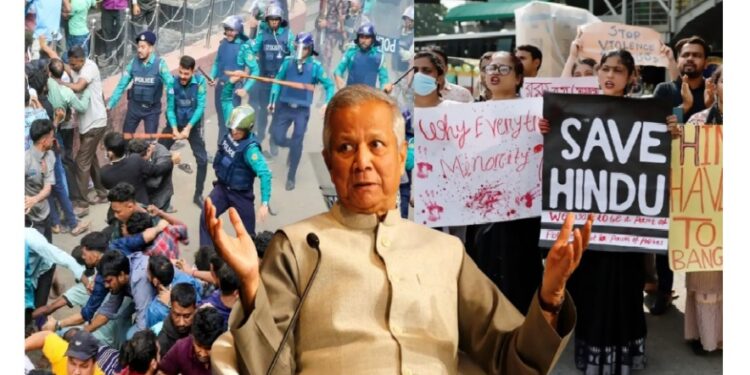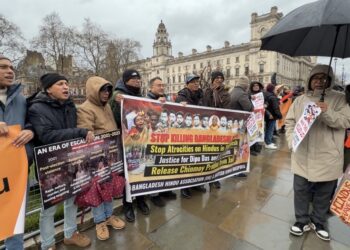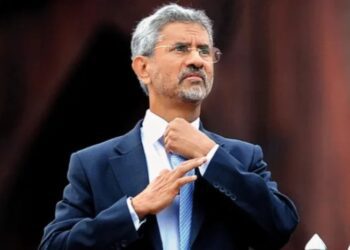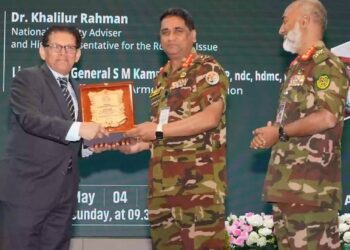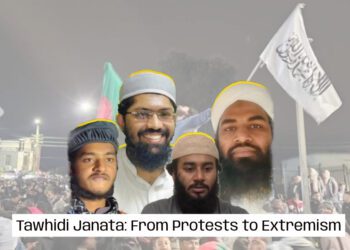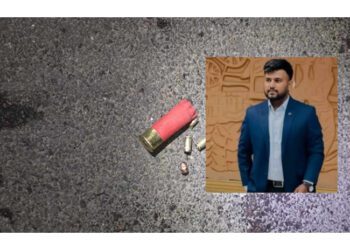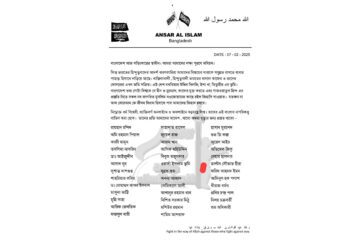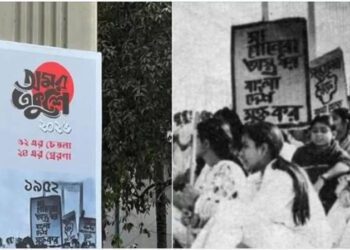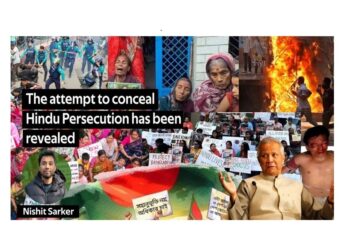Nobel Laureate Dr. Mohammed Yunus, Chief Advisor of the Interim Government of Bangladesh. Dr. Yunus took oath on 8 August 2024, continues to benefit from substantial privileges despite replicating many actions of the deposed Prime Minister Sheikh Hasina. These include governance influenced by the whims of Anti-Discrimination Student Movement leaders and increased violations of the rights of indigenous peoples and religious minorities. Notably, the indemnity granted by the Bangladesh Government, which prevents law enforcement from arresting or prosecuting individuals involved in the July-August uprising—where at least 44 policemen were killed—stands as an unprecedented action, one that even Sheikh Hasina did not undertake.
Gross human rights violations committed during the first 100 days of Dr. Yunus with impunity as summarized below expose little or no improvement of human rights situation in Bangladesh:
- Criminal cases against at least 2,72,316 persons, mainly political opponents, in 1,598 cases from August to October 2024;
- Targeting of about 354 journalists including acts of violence against at least 74 journalists, criminal cases against at least 113 journalists and cancellation of press accreditation of at least 167 journalists;
- Establishment of compliant judiciary by removing five Supreme Court judges including the Supreme Court Chief Justice and 12 High Court judges because of the protests of the Anti-Discrimination Student Movement;
- Dissolving the NHRC by forcing all the members to resign on 7 November because of the critical monthly report in October which were contrary to the Interim Government’s claims on law and order situation;
- Use of the discredited International War Crimes Tribunal against political opponents in more than 80 complaints of crimes against humanity and genocide filed as of 4 November 2024;
- Increased attacks on indigenous peoples in the Chittagong Hill Tracts (CHTs) from 19 September to 1 October 2024 in which at least four indigenous persons were killed, 75 indigenous hill people were seriously injured and at least 142 houses, shops and other business establishments, properties, Buddhist temples were looted, destroyed or set ablaze on which the report of the government’s Inquiry Commission has not been made public as yet;
- Complete “NO” to the implementation of the CHTs Peace Accord by Dr Mohammed Yunus;
- Over 2,000 cases of alleged attacks on the religious minorities dismissed by Dr Yunus without any investigation that the Hindu minorities faced attacks because “there is no clear distinction between Awami League supporters and Hindus”;
- Effective ban on the freedom of association and peaceful assembly by the indigenous peoples and the religious minorities as shown from the systematic attacks upon indigenous peoples from 19 September to 1 October in the Chittagong Hill Tracts following the “March For Identity” organized by “Sanghat O Boishamyo Birodhi Pahari Chhatra Andolan” (Anti Conflict & Discrimination Tribal Students Movement) at Khagrachari on 18 September 2024, and registration of a case naming 582 people, mainly Hindus as accused after acts of violence upon the Hindus on 5 November in the Hazari Gali area Chittagong;
- Continuous use of the draconian Cyber Security Act with 11 cases having been filed with no signs for repeal of the Act;
- Indemnity issued by the Bangladesh Home Ministry barring the law enforcement personnel from arresting or filing cases against anyone involved in the July-August uprising15 in which at least 44 policemen were killed; and
- Attempt to establish ‘Awami League Free Bangladesh’ by banning its students wing, Chhatra League, as a terrorist organization, excluding the Awami League led 14-party alliance from any discussion on the proposed reforms and thereby seeking the Awami League ban from participation in the elections.
As late as 14 November, Dr. Yunus reiterated that elections would be held only after implementing reforms. These reforms, which could take months or even years, allow him to remain in power despite the possibility that the next elected government might ultimately reject them.
Any challenge to these proposed reforms or delays in holding elections has been stifled by fear of public backlash. Even the Bangladesh National Party (BNP), the main opposition, has hesitated to appear opposed to the students’ sentiments. Meanwhile, the Jamaat-e-Islami has emerged as a critical supporter of Dr. Yunus’s government. By banning the Chhatra League, the student wing of the Awami League, as a terrorist organization, and burning down the headquarters of the Jatiya Party—an Awami League ally—on the night of 31 October with apparent impunity, the Interim Government seems to have chosen an irreversible course.
Dr. Yunus appears to have missed a significant opportunity to establish genuine democracy in Bangladesh through national reconciliation. If the international community continues to back these so-called reforms without considering that such sweeping changes might be unacceptable to the next elected government, Bangladesh risks a deeper failure.
The recommendations of the UN High Commissioner for Human Rights to establish a presence in Bangladesh remain crucial. Such a mission could assist in the “transition process” by offering guidance on legal, institutional, economic, and social reforms, as well as transitional justice, reconciliation, and healing.
On addressing human rights violations during the first 100 days, UN High Commissioner for Human Rights Volker Turk and his office have been more assertive and proactive than many international NGOs monitoring the situation in Bangladesh. This proactive stance underscores the severity of the situation but also reflects poorly on the broader international response.

